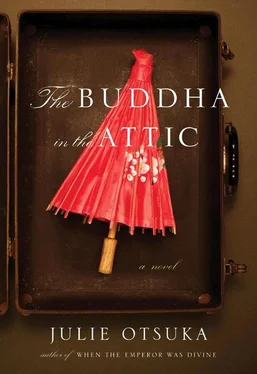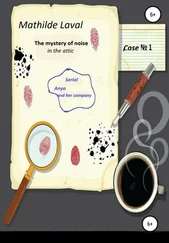ON THE BOAT we often stood on the deck for hours with the wind in our hair, watching the other passengers go by. We saw turbaned Sikhs from the Punjab who were fleeing to Panama from their native land. We saw wealthy White Russians who were fleeing the revolution. We saw Chinese laborers from Hong Kong who were going to work in the cotton fields of Peru. We saw King Lee Uwanowich and his famous band of gypsies, who owned a large cattle ranch in Mexico and were rumored to be the richest band of gypsies in the world. We saw a trio of sunburned German tourists and a handsome Spanish priest and a tall, ruddy Englishman named Charles, who appeared at the railing every afternoon at quarter past three and walked several brisk lengths of the deck. Charles was traveling in first class, and had dark green eyes and a sharp, pointy nose, and spoke perfect Japanese, and was the first white person many of us had ever seen. He was a professor of foreign languages at the university in Osaka, and had a Japanese wife, and a child, and had been to America many times, and was endlessly patient with our questions. Was it true that Americans had a strong animal odor? (Charles laughed and said, “Well, do I?” and let us lean in close for a sniff.) And just how hairy were they? (“About as hairy as I am,” Charles replied, and then he rolled up his sleeves to show us his arms, which were covered with dark brown hairs that made us shiver.) And did they really grow hair on their chests? (Charles blushed and said he could not show us his chest, and we blushed and explained that we had not asked him to.) And were there still savage tribes of Red Indians wandering all over the prairies? (Charles told us that all the Red Indians had been taken away, and we breathed a sigh of relief.) And was it true that the women in America did not have to kneel down before their husbands or cover their mouths when they laughed? (Charles stared at a passing ship on the horizon and then sighed and said, “Sadly, yes.”) And did the men and women there really dance cheek to cheek all night long? (Only on Saturdays, Charles explained.) And were the dance steps very difficult? (Charles said they were easy, and gave us a moonlit lesson on the fox-trot the following evening on the deck. Slow, slow, quick, quick. ) And was downtown San Francisco truly bigger than the Ginza? (Why, of course.) And were the houses in America really three times the size of our own? (Indeed they were.) And did each house have a piano in the front parlor? (Charles said it was more like every other house.) And did he think we would be happy there? (Charles took off his glasses and looked down at us with his lovely green eyes and said, “Oh yes, very.”)
SOME OF US on the boat could not resist becoming friendly with the deckhands, who came from the same villages as we did, and knew all the words to our songs, and were constantly asking us to marry them. We already are married, we would explain, but a few of us fell in love with them anyway. And when they asked if they could see us alone—that very same evening, say, on the tween deck, at quarter past ten—we stared down at our feet for a moment and then took a deep breath and said, “Yes,” and this was another thing we would never tell our husbands. It was the way he looked at me , we would think to ourselves later. Or, He had a nice smile .
ONE OF US on the boat became pregnant but did not know it, and when the baby was born nine months later the first thing she would notice was how much it resembled her new husband. He’s got your eyes . One of us jumped overboard after spending the night with a sailor and left behind a short note on her pillow: After him, there can be no other . Another of us fell in love with a returning Methodist missionary she had met on the deck, and even though he begged her to leave her husband for him when they got to America she told him that she could not. “I must remain true to my fate,” she said to him. But for the rest of her life she would wonder about the life that could have been.
SOME OF US on the boat were brooders by nature, and preferred to stay to ourselves, and spent most of the voyage lying facedown in our berths, thinking of all the men we had left behind. The fruit seller’s son, who always pretended not to notice us but gave us an extra tangerine whenever his mother was not minding the store. Or the married man for whom we had once waited, on a bridge, in the rain, late at night, for two hours. And for what? A kiss and a promise. “I’ll come again tomorrow,” he’d said. And even though we never saw him again we knew we would do it all over in an instant, because being with him was like being alive for the very first time, only better. And often, as we were falling asleep, we found ourselves thinking of the peasant boy we had talked to every afternoon on our way home from school—the beautiful young boy in the next village whose hands could coax up even the most stubborn of seedlings from the soil—and how our mother, who knew everything, and could often read our mind, had looked at us as though we were crazy. Do you want to spend the rest of your life crouched over a field? (We had hesitated, and almost said yes, for hadn’t we always dreamed of becoming our mother? Wasn’t that all we had ever once wanted to be?)
ON THE BOAT we each had to make choices. Where to sleep and who to trust and who to befriend and how to befriend her. Whether or not to say something to the neighbor who snored, or talked in her sleep, or to the neighbor whose feet smelled even worse than our own, and whose dirty clothes were strewn all over the floor. And if somebody asked us if she looked good when she wore her hair in a certain way—in the “eaves” style, say, which seemed to be taking the boat by storm—and she did not, it made her head look too big, did we tell her the truth, or did we tell her she had never looked better? And was it all right to complain about the cook, who came from China, and only knew how to make one dish—rice curry—which he served to us day after day? But if we said something and he was sent back to China, where on many days you might not get any kind of rice at all, would it then be our fault? And was anybody listening to us anyway? Did anybody care?
SOMEWHERE on the boat there was a captain, from whose cabin a beautiful young girl was said to emerge every morning at dawn. And of course we were all dying to know: Was she one of us, or one of the girls from first class?
ON THE BOAT we sometimes crept into each other’s berths late at night and lay quietly side by side, talking about all the things we remembered from home: the smell of roasted sweet potatoes in early autumn, picnics in the bamboo grove, playing shadows and demons in the crumbling temple courtyard, the day our father went out to fetch a bucket of water from the well and did not return, and how our mother never mentioned him even once after that. It was as though he never even existed. I stared down into that well for years . We discussed favorite face creams, the benefits of leaden powder, the first time we saw our husband’s photograph, what that was like. He looked like an earnest person, so I figured he was good enough for me . Sometimes we found ourselves saying things we had never said to anyone, and once we got started it was impossible to stop, and sometimes we grew suddenly silent and lay tangled in each other’s arms until dawn, when one of us would pull away from the other and ask, “But will it last?” And that was another choice we had to make. If we said yes, it would last, and went back to her—if not that night, then the next, or the night after that—then we told ourselves that whatever we did would be forgotten the minute we got off the boat. And it was all good practice for our husbands anyway.
Читать дальше












